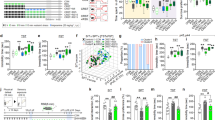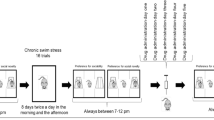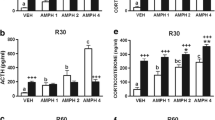Abstract
Rationale
Glucocorticoids facilitate coping with stress, but their high levels have been also implicated in mood disorders. Due to this duality, the role of glucocorticoid signaling in the development of the first episodes of stress-induced depression remains unclear.
Objectives
To address this issue, effects of the glucocorticoid signal modulation on depressive-like behavior during pretest and test Porsolt swim sessions were examined.
Methods
Metyrapone (MET; 150 mg/kg, i.p.) was injected 3 h before pretest to block stress-induced increase in corticosterone levels. Dexamethasone (DEX; 0.2 mg/kg, s.c.) was applied to MET-treated rats 1 h before both pretest and test sessions. In addition to behavior during these sessions, glucocorticoid receptor (GR) expression was analyzed by immunohistochemistry 2 h after the second swim.
Results
In pretest, MET-treated rats exhibited increased latency to immobility and shortened immobility. DEX reversed the behavioral effects of MET in the pretest. In the test, animals from MET + DEX group unexpectedly exhibited an antidepressant-like behavior. Swim stress increased GR expression in the frontal cortex irrespective of the pharmacological treatment. A significant elevation in GR expression was found in the prefrontal cortex (PFC) of stressed MET + DEX-treated rats and in the PFC of unstressed rats 6 h after injection of DEX alone.
Conclusion
The data suggest that the increase in glucocorticoid levels under swim stress during pretest directly contributes to the development of the immobility response. Transition of DEX effect from prodepressant in the pretest to an antidepressant in the test was associated with the elevation in the PFC GR expression.





Similar content being viewed by others
References
Alboni S, Tascedda F, Corsini D, Benatti C, Caggia F, Capone G, Barden N, Blom JM, Brunello N (2011) Stress induces altered CRE/CREB pathway activity and BDNF expression in the hippocampus of glucocorticoid receptor-impaired mice. Neuropharmacol 60:1337–46
Arana GW, Santos AB, Laraia MT, McLeod-Bryant S, Beale MD, Rames LJ, Roberts JM, Dias JK, Molloy M (1995) Dexamethasone for the treatment of depression: a randomized, placebo-controlled, double-blind trial. Am J Psychiatry 152:265–7
Báez M, Volosin M (1994) Corticosterone influences forced swim-induced immobility. Pharmacol Biochem Behav 49:729–36
Berry A, Bellisario V, Capoccia S, Tirassa P, Calza A, Alleva E, Cirulli F (2012) Social deprivation stress is a triggering factor for the emergence of anxiety- and depression-like behaviours and leads to reduced brain BDNF levels in C57BL/6J mice. Psychoneuroendocrinology 37:762–72
Brown ES, Vera E, Frol AB, Woolsto DJ, Johnson B (2007) Effects of chronic prednisone therapy on mood and memory. J Affect Disord 99:279–83
Canini F, Brahim S, Drouet JB, Michel V, Alonso A, Buguet A, Cespuglio R (2009) Metyrapone decreases locomotion acutely. Neurosci Lett 457:41–4
Caudal D, Jay TM, Godsil BP (2014) Behavioral stress induces regionally-distinct shifts of brain mineralocorticoid and glucocorticoid receptor levels. Front Behav Neurosci 29:8–19
Chaouloff F (2000) Serotonin, stress and corticoids. J Psychopharmacol 14:139–51
Checkley S (1996) The neuroendocrinology of depression and chronic stress. Br Med Bull 52:597–617
Chiba S, Numakawa T, Ninomiya M, Richards MC, Wakabayashi C, Kunugi H (2012) Chronic restraint stress causes anxiety- and depression-like behaviors, downregulates glucocorticoid receptor expression, and attenuates glutamate release induced by brain-derived neurotrophic factor in the prefrontal cortex. Prog Neuropsychopharmacol Biol Psychiatry 39:112–9
Cryan JF, Valentino RJ, Lucki I (2005) Assessing substrates underlying the behavioral effects of antidepressants using the modified rat forced swimming test. Neurosci Biobehav Rev 29:547–69
Datson NA, van den Oever JM, Korobko OB, Magarinos AM, de Kloet ER, McEwen BS (2013) Previous history of chronic stress changes the transcriptional response to glucocorticoid challenge in the dentate gyrus region of the male rat hippocampus. Endocrinol 154:3261–72
de Kloet ER (1997) Why dexamethasone poorly penetrates in brain. Stress 2:13–20
de Kloet ER, Vreugdenhil E, Oitzl MS, Joëls M (1998) Brain corticosteroid receptor balance in health and disease. Endocr Rev 19:269–301
de Kloet ER, Derijk RH, Meijer OC (2007) Therapy insight: is there an imbalanced response of mineralocorticoid and glucocorticoid receptors in depression? Nat Clin Pract Endocrinol Metab 3:168–79
Dinan TG, Lavelle E, Cooney J, Burnett F, Scott L, Dash A, Thakore J, Berti C (1997) Dexamethasone augmentation in treatment-resistant depression. Acta Psychiatr Scand 95:58–61
Drakulić D, Veličković N, Stanojlović M, Grković I, Mitrović N, Lavrnja I, Horvat A (2013) Low-dose dexamethasone treatment promotes the pro-survival signalling pathway in the adult rat prefrontal cortex. J Neuroendocrinol 25:605–16
Drouet JB, Michel V, Peinnequin A, Alonso A, Fidier N, Maury R, Buguet A, Cespuglio R, Canini F (2010) Metyrapone blunts stress-induced hyperthermia and increased locomotor activity independently of glucocorticoids and neurosteroids. Psychoneuroendocrinology 35:1299–310
Du J, McEwen B, Manji HK (2009) Glucocorticoid receptors modulate mitochondrial function: a novel mechanism for neuroprotection. Commun Integr Biol 2:350–2
Dygalo NN, Kalinina TS, Bulygina VV, Shishkina GT (2012) Increased expression of the anti-apoptotic protein Bcl-xL in the brain is associated with resilience to stress-induced depression-like behavior. Cell Mol Neurobiol 32:767–76
Fujikawa T, Soya H, Fukuoka H, Alam KS, Yoshizato H, McEwen BS, Nakashima K (2000) A biphasic regulation of receptor mRNA expressions for growth hormone, glucocorticoid and mineralocorticoid in the rat dentate gyrus during acute stress. Brain Res 874:186–93
Gascoyne DM, Kypta RM, Vivanco MM (2003) Glucocorticoids inhibit apoptosis during fibrosarcoma development by transcriptionally activating Bcl-xL. J Biol Chem 278:18022–9
Gibbons JL (1964) Cortisol secretion rate in depressive illness. Arch Gen Psychiatry 10:572–5
Harris AP, Holmes MC, de Kloet ER, Chapman KE, Seckl JR (2013) Mineralocorticoid and glucocorticoid receptor balance in control of HPA axis and behavior. Psychoneuroendocrinology 38:648–58
Healy DG, Harkin A, Cryan JF, Kelly JP, Leonard BE (1999) Metyrapone displays antidepressant-like properties in preclinical paradigms. Psychopharmacol (Berl) 145:303–8
Herbert J (2012) Cortisol and depression: three questions for psychiatry. Psychol Med 8:1–21
Holsboer F, Barden N (1996) Antidepressants and hypothalamic-pituitary-adrenocortical regulation. Endocr Rev 17:187–205
Jefferys D, Copolov D, Irby D, Funder J (1983) Behavioural effect of adrenalectomy: reversal by glucocorticoids or [d-Ala2, Met5] enkephalinamide. Eur J Pharmacol 92:99–103
Jiang P, Xue Y, Li HD, Liu YP, Cai HL, Tang, MM, Zhang LH (2014) Dysregulation of vitamin D metabolism in the brain and myocardium of rats following prolonged exposure to dexamethasone. Psychopharmacol (Berl)
Johnson SA, Fournier NM, Kalynchuk LE (2006) Effect of different doses of corticosterone on depression-like behavior and HPA axis responses to a novel stressor. Behav Brain Res 168:280–8
Jovanovic T, Phifer JE, Sicking K, Weiss T, Norrholm SD, Bradley B, Ressler KJ (2011) Cortisol suppression by dexamethasone reduces exaggerated fear responses in posttraumatic stress disorder. Psychoneuroendocrinology 36:1540–52
Karandrea D, Kittas C, Kitraki E (2002) Forced swimming differentially affects male and female brain corticosteroid receptors. Neuroendocrinol 75:217–26
Karssen AM, Meijer OC, Berry A, Sanjuan Piñol R, de Kloet ER (2005) Low doses of dexamethasone can produce a hypocorticosteroid state in the brain. Endocrinol 146:5587–95
Kelly KJ, Donner NC, Hale MW, Lowry CA (2011) Swim stress activates serotonergic and nonserotonergic neurons in specific subdivisions of the rat dorsal raphe nucleus in a temperature-dependent manner. Neurosci 197:251–68
Kendler KS, Karkowski LM, Prescott CA (1999) Causal relationship between stressful life events and the onset of major depression. Am J Psychiatry 156:837–41
Kessing LV, Agerbo E, Mortensen PB (2003) Does the impact of major stressful life events on the risk of developing depression change throughout life? Psychol Med 33:1177–84
Mason BL, Pariante CM, Thomas SA (2008) A revised role for P-glycoprotein in the brain distribution of dexamethasone, cortisol, and corticosterone in wild-type and ABCB1A/B-deficient mice. Endocrinol 149:5244–53
McKernan DP, Dinan TG, Cryan JF (2009) “Killing the Blues”: a role for cellular suicide (apoptosis) in depression and the antidepressant response? Prog Neurobiol 88:246–63
McKlveen JM, Myers B, Flak JN, Bundzikova J, Solomon MB, Seroogy KB, Herman JP (2013) Role of prefrontal cortex glucocorticoid receptors in stress and emotion. Biol Psychiatry 74:672–9
Mondelli V, Pariante CM, Navari S, Aas M, D’Albenzio A, Di Forti M, Handley R, Hepgul N, Marques TR, Taylor H, Papadopoulos AS, Aitchison KJ, Murray RM, Dazzan P (2010) Higher cortisol levels are associated with smaller left hippocampal volume in first-episode psychosis. Schizophr Res 119:75–8
Murakami S, Imbe H, Morikawa Y, Kubo C, Senba E (2005) Chronic stress, as well as acute stress, reduces BDNF mRNA expression in the rat hippocampus but less robustly. Neurosci Res 53:129–39
Noguchi T, Makino S, Matsumoto R, Nakayama S, Nishiyama M, Terada Y, Hashimoto K (2010) Regulation of glucocorticoid receptor transcription and nuclear translocation during single and repeated immobilization stress. Endocrinol 151:4344–55
O’Dwyer AM, Lightman SL, Marks MN, Checkley SA (1995) Treatment of major depression with metyrapone and hydrocortisone. J Affect Disord 33:123–8
Oitzl MS, Champagne DL, van der Veen R, de Kloet ER (2010) Brain development under stress: hypotheses of glucocorticoid actions revisited. Neurosci Biobehav Rev 34:853–66
Pariante CM (2003) Depression, stress and the adrenal axis. J Neuroendocrinol 15:811–2
Paskitti ME, McCreary BJ, Herman JP (2000) Stress regulation of adrenocorticosteroid receptor gene transcription and mRNA expression in rat hippocampus: time-course analysis. Brain Res Mol Brain Res 80:142–52
Paxinos G, Watson C (1998) The rat brain in stereotaxic coordinates, 4th edn. Academic, London
Porsolt RD, Anton G, Blavet N, Jalfre M (1978) Behavioural despair in rats: a new model sensitive to antidepressant treatments. Eur J Pharmacol 47:379–91
Putman P, Roelofs K (2011) Effects of single cortisol administrations on human affect reviewed: coping with stress through adaptive regulation of automatic cognitive processing. Psychoneuroendocrinology 36:439–48
Reul JM, de Kloet ER (1985) Two receptor systems for corticosterone in rat brain: microdistribution and differential occupation. Endocrinol 117:2505–11
Reul JM, van den Bosch FR, de Kloet ER (1987) Relative occupation of type-I and type-II corticosteroid receptors in rat brain following stress and dexamethasone treatment: functional implications. J Endocrinol 115:459–67
Reul JM, Pearce PT, Funder JW, Krozowski ZS (1989) Type I and type II corticosteroid receptor gene expression in the rat: effect of adrenalectomy and dexamethasone administration. Mol Endocrinol 3:1674–80
Ridder S, Chourbaji S, Hellweg R, Urani A, Zacher C, Schmid W, Zink M, Hörtnagl H, Flor H, Henn FA, Schütz G, Gass P (2005) Mice with genetically altered glucocorticoid receptor expression show altered sensitivity for stress-induced depressive reactions. J Neurosci 25:6243–50
Robertson DA, Beattie JE, Reid IC, Balfour DJ (2005) Regulation of corticosteroid receptors in the rat brain: the role of serotonin and stress. Eur J Neurosci 21:1511–20
Roozendaal B, Bohus B, McGaugh JL (1996) Dose-dependent suppression of adrenocortical activity with metyrapone: effects on emotion and memory. Psychoneuroendocrinology 21:681–93
Sapolsky RM, McEwen BS (1985) Down-regulation of neural corticosterone receptors by corticosterone and dexamethasone. Brain Res 339:161–5
Saveanu RV, Nemeroff CB (2012) Etiology of depression: genetic and environmental factors. Psychiatr Clin North Am 35:51–71
Shishkina GT, Kalinina TS, Dygalo NN (2007) Up-regulation of tryptophan hydroxylase-2 mRNA in the rat brain by chronic fluoxetine treatment correlates with its antidepressant effect. Neurosci 150:404–12
Shishkina GT, Kalinina TS, Berezova IV, Bulygina VV, Dygalo NN (2010) Resistance to the development of stress-induced behavioral despair in the forced swim test associated with elevated hippocampal Bcl-xl expression. Behav Brain Res 213:218–24
Shishkina GT, Kalinina TS, Berezova IV, Dygalo NN (2012) Stress-induced activation of the brainstem Bcl-xL gene expression in rats treated with fluoxetine: correlations with serotonin metabolism and depressive-like behavior. Neuropharmacol 62:177–83
Solomon MB, Furay AR, Jones K, Packard AE, Packard BA, Wulsin AC, Herman JP (2012) Deletion of forebrain glucocorticoid receptors impairs neuroendocrine stress responses and induces depression-like behavior in males but not females. Neurosci 203:135–43
Sterner EY, Kalynchuk LE (2010) Behavioral and neurobiological consequences of prolonged glucocorticoid exposure in rats: relevance to depression. Prog Neuropsychopharmacol Biol Psychiatry 34:777–90
Stone EA, Lin Y (2008) An anti-immobility effect of exogenous corticosterone in mice. Eur J Pharmacol 580:135–42
Unemura K, Kume T, Kondo M, Maeda Y, Izumi Y, Akaike A (2012) Glucocorticoids decrease astrocyte numbers by reducing glucocorticoid receptor expression in vitro and in vivo. J Pharmacol Sci 119:30–9
Veldhuis HD, de Korte CC, de Kloet ER (1985) Glucocorticoids facilitate the retention of acquired immobility during forced swimming. Eur J Pharmacol 115:211–7
Viegas LR, Vicent GP, Baranao JL, Beato M, Pecci A (2004) Steroid hormones induce bcl-X gene expression through direct activation of distal promoter P4. J Biol Chem 279:9831–9
Vincent MY, Hussain RJ, Zampi ME, Sheeran K, Solomon MB, Herman JP, Khan A, Jacobson L (2013) Sensitivity of depression-like behavior to glucocorticoids and antidepressants is independent of forebrain glucocorticoid receptors. Brain Res 1525:1–15
Wang Q, Yu K, Wang J, Lin H, Wu Y, Wang W (2012) Predator stress-induced persistent emotional arousal is associated with alterations of plasma corticosterone and hippocampal steroid receptors in rat. Behav Brain Res 230:167–74
Wann BP, Bah TM, Boucher M, Courtemanche J, Le Marec N, Rousseau G, Godbout R (2007) Vulnerability for apoptosis in the limbic system after myocardial infarction in rats: a possible model for human postinfarct major depression. J Psychiatry Neurosci 32:11–16
Zhao Y, Xie W, Dai J, Wang Z, Huang Y (2009) The varying effects of short-term and long-term corticosterone injections on depression-like behavior in mice. Brain Res 1261:82–90
Acknowledgments
This study was supported by Russian Fund for Basic Research N 12-04-01102 and Grant from RAS N 6.19.
Conflict of interest
The authors declare that they have no conflicts of interest.
Author information
Authors and Affiliations
Corresponding author
Rights and permissions
About this article
Cite this article
Shishkina, G.T., Bulygina, V.V. & Dygalo, N.N. Behavioral effects of glucocorticoids during the first exposures to the forced swim stress. Psychopharmacology 232, 851–860 (2015). https://doi.org/10.1007/s00213-014-3718-8
Received:
Accepted:
Published:
Issue Date:
DOI: https://doi.org/10.1007/s00213-014-3718-8




